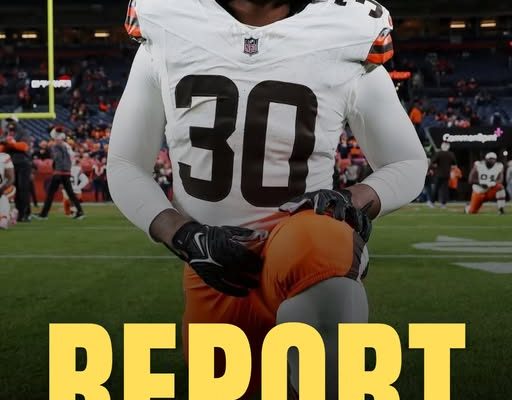The Cleveland Browns, a franchise familiar with challenges both on and off the field, are once again facing unwanted attention after linebacker Devin Bush Jr. was charged with misdemeanor simple assault and harassment following a disturbing incident at his suburban Pittsburgh home. According to the Associated Press, the former Michigan star and first-round NFL Draft pick allegedly chased his girlfriend, pinned her against a massage table, smashed her phone to prevent her from calling for help, and left her with visible injuries to her wrist and foot. Bush reportedly admitted to destroying the phone but denied physically assaulting the woman. As the legal system prepares to sort through the facts and determine the appropriate consequences, the NFL and the Browns are left to navigate another case that sits at the uncomfortable crossroads of football, fame, and domestic violence.
This incident involving Devin Bush Jr. isn’t just another blip on the NFL’s disciplinary radar; it’s another sobering reminder of the persistent, complicated relationship between professional athletes and domestic violence allegations. It’s a reminder that no matter how much progress is touted by leagues or how many policies are rewritten, society still must contend with a painful truth: violence in intimate relationships can transcend fame, wealth, or career prestige. And when it comes to holding athletes accountable, the line between law, league discipline, and public opinion often becomes blurred, if not entirely shattered.
What makes this case particularly troubling is the level of detail reported in the initial police investigation. According to the official account, Bush did not merely have a verbal dispute with his partner. The altercation allegedly escalated to the point where physical intimidation and violence were used to assert control. The claim that Bush chased his girlfriend, physically restrained her, and intentionally disabled her ability to seek help is serious. These are not ambiguous actions open to broad interpretation; if proven true, they are deeply indicative of behaviors associated with domestic abuse.
Bush’s denial of physically assaulting his girlfriend, juxtaposed with his admission to destroying her phone, adds complexity to the case. Legally, the act of breaking someone’s phone to prevent them from calling for help can qualify as a form of coercive control or obstruction. It’s not merely a property crime; it’s an action rooted in dominance, potentially classifiable as part of a larger pattern of abusive behavior. In Pennsylvania, where the alleged incident occurred, such behavior is not taken lightly. Law enforcement agencies have increasingly prioritized domestic violence training and are better equipped to detect and respond to controlling or threatening behavior even when there’s no direct admission of physical assault.
For Devin Bush Jr., this incident could not have come at a worse time. After a rocky few years trying to find stability in the NFL, he landed a new opportunity with the Cleveland Browns, a team attempting to retool its defense and boost its playoff hopes. His career had already seen its share of ups and downs, including criticism about his performance, questions surrounding his maturity, and injuries that derailed early momentum. This altercation, now part of the public record and potentially eligible for NFL disciplinary action, could derail his career entirely if not resolved swiftly and transparently.
But beyond Bush’s professional future, we must turn our attention to the woman involved in this incident—the survivor. Far too often, in sports reporting, the focus centers exclusively on the accused athlete, with little attention paid to the lived experiences and trauma of their partners. If the allegations are accurate, Bush’s girlfriend experienced a terrifying encounter that left her physically harmed and emotionally shaken. And like many survivors, she likely had to make a difficult decision about whether to come forward. Even with mounting evidence, societal pressures often discourage victims from speaking out, particularly when the accused is a public figure.
The legal and judicial outcomes of this case remain to be seen, but what’s certain is that this episode invites broader conversations around domestic violence, masculinity in sports, and the role of accountability in high-stakes athletic environments. The NFL has tried over the years to reckon with its problematic history regarding domestic violence. High-profile cases like those involving Ray Rice, Greg Hardy, and Kareem Hunt have forced the league to adopt stricter policies. These include mandatory suspensions for violations of the league’s personal conduct policy and partnerships with organizations focused on preventing domestic violence.
Yet policy alone does not solve cultural issues. The NFL, like many major sports leagues, still often finds itself entangled in a web of complicity. Teams sometimes look the other way or offer second chances if a player has elite talent or can fill a critical need on the roster. And while every accused individual is entitled to due process and the presumption of innocence until proven guilty, there is often a stark difference between legal innocence and moral responsibility. The Cleveland Browns themselves are not new to controversy, having previously taken heat for acquiring players with checkered pasts in the hopes of a football payoff.
In fact, the Browns’ recent history with Deshaun Watson—a quarterback accused by more than two dozen women of sexual misconduct—raised eyebrows across the league and beyond. The franchise traded for Watson and handed him a record-setting contract despite unresolved civil cases and league investigations. That decision was widely interpreted by critics as prioritizing wins over ethics. Now, the Bush situation threatens to reinforce that image unless the organization acts decisively, communicates clearly with its fans, and supports any legal processes and league investigations with full transparency.
From a psychological and sociological standpoint, cases like this are a reminder that domestic violence is not always about rage or passion—it is frequently about control. The behavior described in the reports surrounding Bush fits many common patterns seen in abusive relationships: isolating the victim, using physical intimidation, destroying property, and then denying responsibility. These patterns are particularly insidious because they erode a person’s autonomy and sense of safety in private settings where they should feel most secure.
Education and prevention must be central to any long-term solution. The NFL and its affiliated institutions must invest more in early intervention programs, not just reactive punishments after the fact. This means working with players as early as college, or even high school, to instill values around consent, healthy communication, and emotional regulation. The pressure cooker environment of elite athletics—where young men are given power, money, and status at a young age—can be a breeding ground for entitlement if not counterbalanced by ethical mentorship and accountability.
Furthermore, the media plays a critical role in how these incidents are portrayed. Sensationalizing the drama or framing these stories as distractions from football cheapens the gravity of what’s at stake. A woman’s life and safety are never a “distraction”; they are a core part of what it means to be a responsible citizen and public figure. Coverage must center the experiences of survivors while also insisting on thorough, fair investigations and reporting.
For Browns fans, the Devin Bush situation may stir conflicted emotions. Some will want to give him the benefit of the doubt until the courts weigh in. Others will feel disillusioned or even betrayed, especially given the team’s existing baggage when it comes to players with troubled histories. The organization owes it to its supporters—not just to its brand or bottom line—to be forthright about how it plans to handle this incident. Silence, or vague statements about ongoing investigations, will only exacerbate public distrust.
And for the broader football world, this moment is yet another opportunity to ask difficult questions about what we value in athletes. Do we prioritize physicality, competitiveness, and results above all else? Or can we begin to demand a more holistic view of what makes a great player—one that includes character, integrity, and personal accountability? Until we do, these stories will continue to surface, each more tragic and preventable than the last.
There is also a legal angle that deserves careful attention. Simple assault and harassment are misdemeanor charges, which might suggest to some that the incident is “not that serious.” But in the context of intimate partner violence, even misdemeanor charges can carry significant implications. They can result in probation, mandatory counseling, restraining orders, or even short jail sentences. Moreover, misdemeanor charges can escalate if patterns of abuse are uncovered or if the victim is placed in continued danger.
The public should also be aware that many domestic violence survivors do not see their abusers face felony charges even when the harm done is severe. The legal system often prioritizes clear evidence of injury or repeated behavior before elevating the charges. That doesn’t mean the pain, fear, or trauma experienced by the victim is any less real. And it certainly doesn’t mean that we, as a society, should brush off misdemeanor domestic violence cases as less worthy of scrutiny or consequence.
In the coming weeks, all eyes will be on how the Browns respond. Will the team suspend Bush pending the outcome of the case? Will the NFL step in under its personal conduct policy to conduct its own investigation? And will Bush, if found guilty, face real consequences not only in the courtroom but in his career?
Bush, a once-promising linebacker who flashed brilliance early in his career, now stands at a crossroads. What he chooses to do next—both legally and personally—will determine the rest of his trajectory. If he is innocent, he must clear his name with dignity and transparency. If he is guilty, even partially, then he owes his victim, the league, and the public a sincere reckoning and commitment to change. There is no glory in hiding behind silence, public relations spin, or legal loopholes.
Ultimately, stories like this are about more than just sports. They are about power, responsibility, and the culture we create around those we elevate. Every time we excuse or minimize violence because of talent, we send a message that some lives are more important than others. That some voices matter less. That winning justifies anything.
The Browns, the NFL, and fans everywhere must decide whether they will keep repeating this cycle or break it—whether they will be part of the problem or part of the solution. For the sake of survivors, the integrity of the sport, and the young fans who watch these players with awe, that choice cannot be made lightly.



